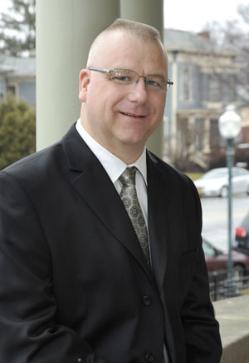
Farming for the Future
by Helen Susan Edelman
 A person can be a true community resource to other people and also to the places where they live and work. Such is the case with Center for Distance Learning graduate Brian Zeidner ’11, who owns a small beef cattle farm in Pennsylvania.
A person can be a true community resource to other people and also to the places where they live and work. Such is the case with Center for Distance Learning graduate Brian Zeidner ’11, who owns a small beef cattle farm in Pennsylvania.
A fascination with wetlands and water quality and a desire to improve the land he calls his home led to college learning that translated into sound conservation practices, which are now benefiting his friends and neighbors.
The 43-acre farm Zeidner operates with his wife, Pat, was the focus of his hands-on project and ultimately the beneficiary of the work he did while studying ecology with Dean Nikki Shrimpton of the college’s Central New York location. Zeidner was on the path to his Master of Science in Business, Management and Economics. Five years later, he saw the successful restoration of wetlands on the farm, including completion of a new pond that filled successfully with water. He fenced livestock out of the pond and wetlands, providing an alternative watering system for the cattle, and managed pastures and animal walkways more purposefully.
Brian and Pat, along with conservation district professionals, also developed a comprehensive nutrient-management plan, which addressed resources on the farm and ultimately prescribed grazing, heavy-use area protection and a waste storage facility. The grazing plan included rotating the animals through the crop fields after the first and second cuttings had been harvested, and stabilizing the laneways and animal concentration area with heavy-use area protection and creation of a stacking area to store manure that accumulates there.
Part of the Zeidner cattle farm operation in Bradford County, Penn., includes stabilization of the laneways and animal concentration areas with heavy use area protection, one of the many ecologically sensitive land-management strategies owners Brian and Pat Zeidner employ.
“The culmination of these projects has allowed me to utilize the property in a more environmentally responsible manner, by implementing several best-management practices in agricultural operations. It also has demonstrated a mutually beneficial working partnership,” said Zeidner, referring to his collaboration with the conservation district, natural gas developers, landowners and conservation professionals, “resulting in environmentally sound enhancements to the family farm.” He emphasizes, “The ecology study at ESC was the catalyst for the project.”
The conservation practices will have long-term, positive effects in the protection of natural resources on the Zeidners’ farm, such as limiting the sediment and nutrients from entering the ground and surface water sources, ensuring the farm’s herd will have sufficient feed for the year, maintaining a 3-inch grass cover to prevent soil erosion and managing the manure generated by the herd. Another significant impact is that the ponded area of the wetland was increased by 0.9 acres to 1.1 acres, of which 0.9 is considered “shallow” (18 inches or less deep), which provides a critical habitat for several wetland species, including amphibians, insects, mammals, reptiles, waterfowl and hydrophytic vegetation. The deeper sections will support several fish species Zeidner plans to introduce.
Involvement in the Community
The Zeidners are members of the Farm Bureau, where Pat serves as a board director, while Brian assists the local Penn State Extension office in providing tractor safety training. He is a member of the Northern Tier Industry and Education Consortium board and plays an integral role on the Bradford County Agricultural Land Preservation board. He also serves as director of member services for the Claverack Rural Electric Cooperative, a member-oriented, nonprofit electric utility dedicated to providing safe and reliable energy and other valuable services to customers.
As stewards of the land they have protected so well, the Zeidners share their good works and good fortune. Since 2013, they have been participating in and hosting field walks and workshops related to grazing and farm management. Brian was recently honored with the Cooperator of the Year award from the Bradford County (Penn.) Conservation District award.
“I love leveraging my ESC learning,” Brian says. “And Dr. Shrimpton was the catalyst to my understanding of ecosystems and responsible resource management.”
Photography Provided